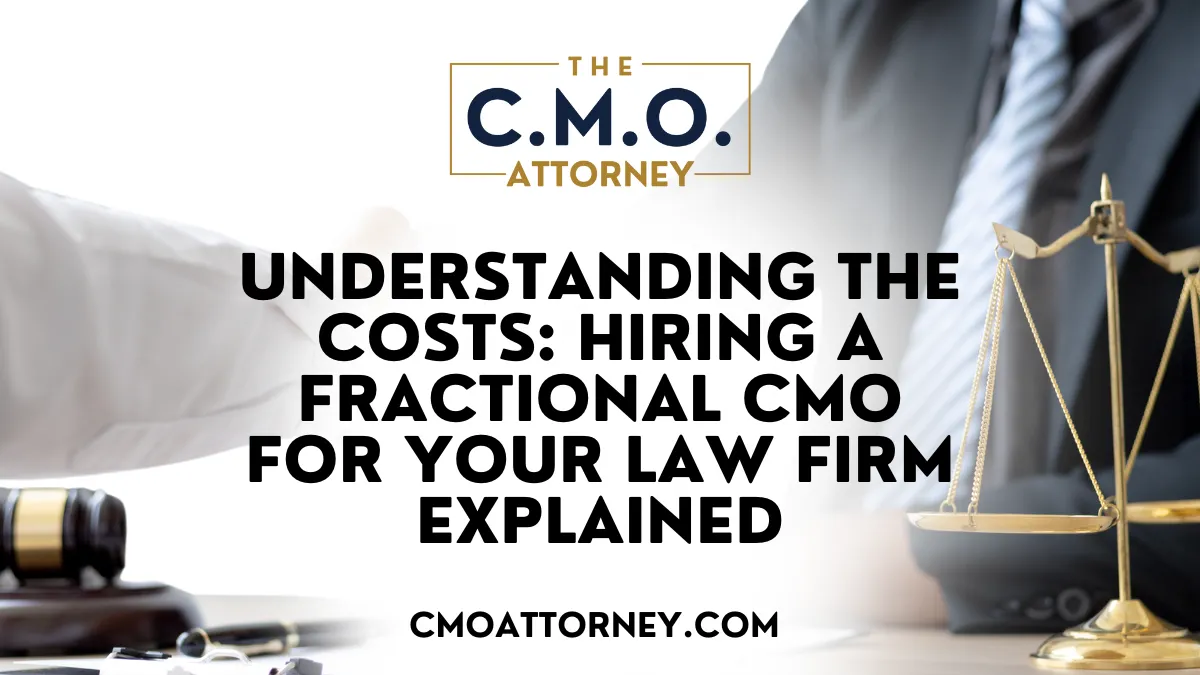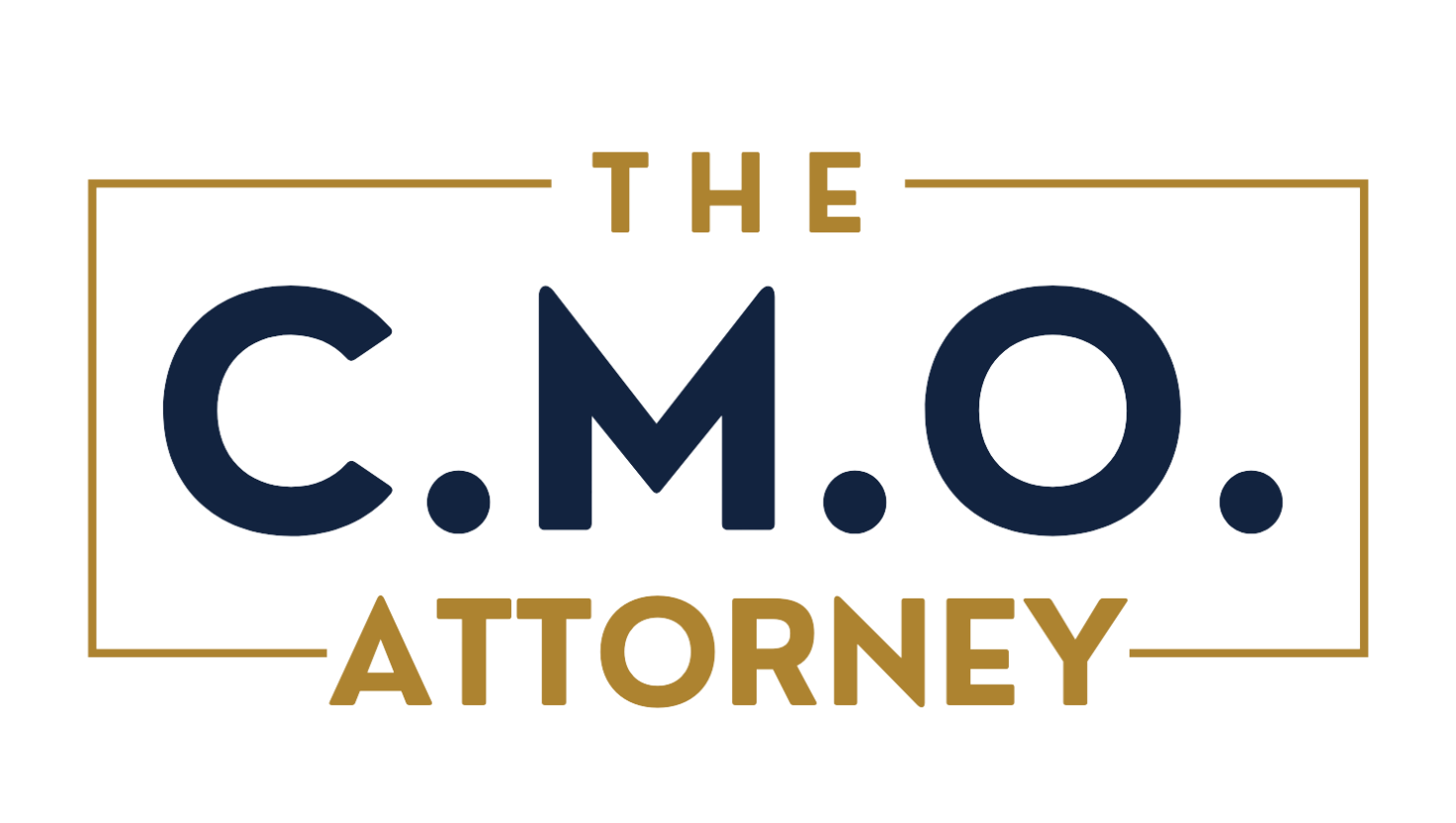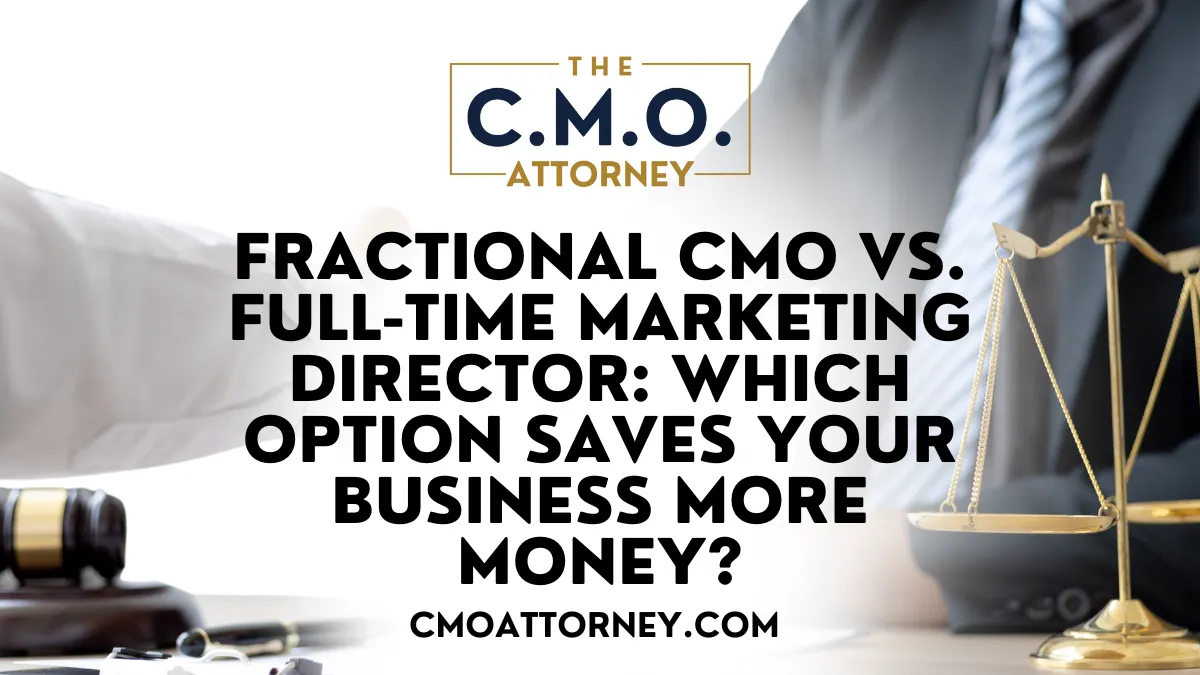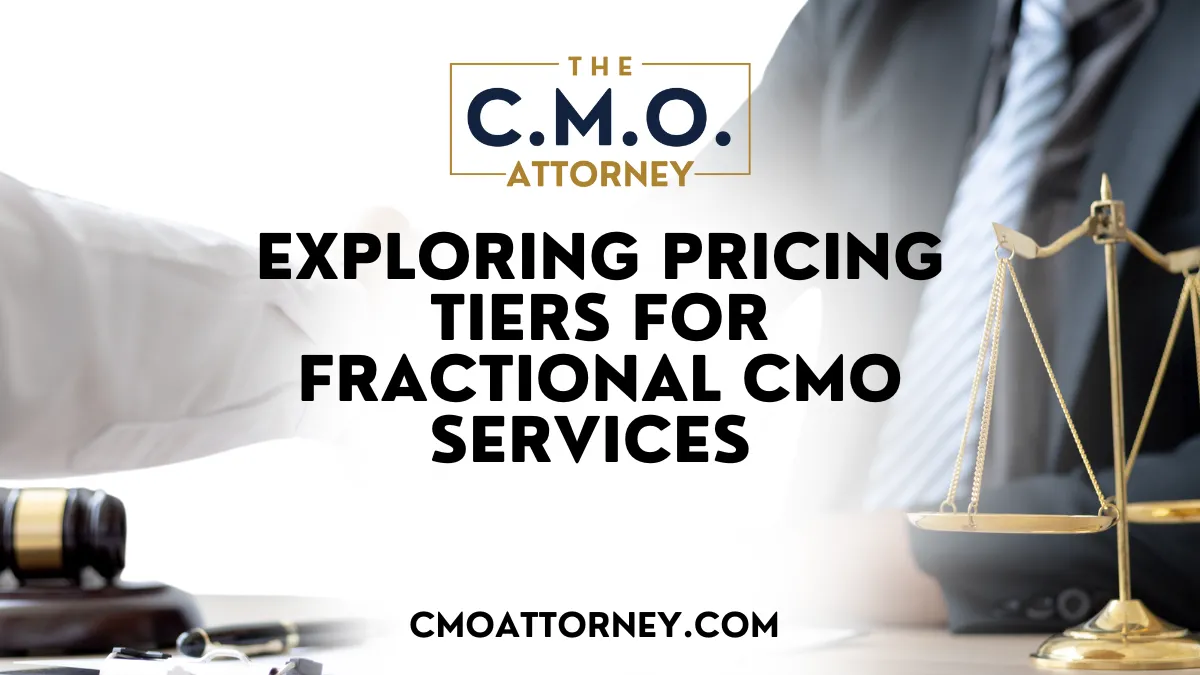 Table Of Contents:
Table Of Contents:
- Understanding the Importance of a Fractional CMO for Law Firms
- Typical Costs Associated With Hiring a Fractional CMO for Law Firms
- Case Studies Demonstrating Financial Impact
- Making the Case for a Fractional CMO in Your Law Firm
- Additional Resources for Law Firms
- Conclusion
What Is the Typical Cost of Hiring a Fractional CMO for a Law Firm?
Hiring a fractional Chief Marketing Officer (CMO) can significantly impact your law firm’s growth, yet many legal professionals remain unaware of its associated costs and benefits. This article will clarify what a fractional CMO is, discuss the typical costs involved, and present case studies demonstrating the financial impact of this decision. By engaging with this content, readers will understand how a fractional marketing agency can provide innovative marketing ideas for law firms, ultimately addressing challenges they face in reaching their target audience. Understanding these aspects can lead to more informed decisions about marketing investments. The CMO Attorney wants you to be educated on the role of fractional CMO – so let’s get started, but if you’re ready – we’re here for a free consultation of your firm’s marketing plan and growth strategy!
James Frazier | The CMO Attorney | Fractional CMO
The Importance of a Fractional CMO for Law Firms
A fractional CMO plays a crucial role in enhancing law firms’ marketing strategies through effective email marketing, graphic design, brand awareness initiatives, and marketing ideas for law firms. This section will define what is a fractional cmo and the role and responsibilities of a fractional CMO, analyze the financial benefits and costs associated with hiring one through a consultation, and evaluate the return on investment compared to a full-time marketing staff. Insights provided will help law firms understand the fractional CMO cost and its value in advancing their marketing objectives.
Defining the Role and Responsibilities of a Fractional CMO
A fractional Chief Marketing Officer (CMO) serves as a strategic leader for law firms, focusing on refining marketing initiatives, such as marketing ideas for law firms, to reach the target audience effectively. This role encompasses various responsibilities, such as developing tailored social media marketing campaigns, overseeing brand strategies, providing training to existing staff to enhance their marketing skills, and offering consultation. By leveraging industry experience, a fractional CMO can significantly boost the firm’s credibility in a competitive landscape.
The compensation associated with hiring a fractional CMO typically presents a cost-effective alternative to employing a full-time marketing staff. Law firms can benefit from their expertise without incurring the overhead costs linked to a permanent position. Through a consultation, this arrangement not only allows the firm to access high-level marketing strategies and marketing ideas for law firms but also ensures that resources are utilized efficiently, promoting sustainable growth while staying aligned with the firm’s overall objectives.
Analyzing the Financial Benefits of Hiring a Fractional CMO
Engaging fractional CMO services can provide law firms with substantial financial benefits by optimizing marketing expenditures and implementing marketing ideas for law firms to improve overall efficiency. For example, a skilled fractional CMO can conduct thorough keyword research to enhance online visibility, answering what is a fractional cmo to ensure that the firm’s digital marketing efforts generate results that align with specific goals. This strategic collaboration allows attorneys to focus on their core legal work while benefiting from high-level marketing insights and consultation without the costly commitment of a full-time employee.
Furthermore, the flexibility of hiring a fractional CMO (what is a fractional cmo) means law firms can adjust their marketing resources according to demand and specific projects. This scalability can translate into a significant asset for managing budgets effectively during consultation while still accessing expert-level marketing strategies and marketing ideas for law firms. By maximizing the return on investment, attorneys can ensure their marketing endeavors are not only cost-efficient but also strategically aligned with the firm’s vision for sustainable growth.
Evaluating the Return on Investment of a Fractional CMO
Evaluating the return on investment of a fractional Chief Marketing Officer (CMO) involves examining how effectively their expertise enhances the firm’s marketing strategy, particularly in areas like search engine optimization and web design. For instance, a fractional CMO can implement targeted strategies to improve online visibility, attract potential clients, and ultimately drive leads using marketing ideas for law firms. By systematically analyzing these outcomes through consultation, law firms can measure the effectiveness of marketing expenditures and their impact on customer acquisition.
The benefits of a fractional CMO extend beyond immediate costs, presenting a long-term value proposition for law firms. Their knowledge allows for the development of data-driven strategies and marketing ideas for law firms that align marketing efforts with the firm’s overall goals, ensuring resources are allocated wisely. This focused approach not only leads to improved customer engagement but also fosters sustainable growth through optimized marketing processes and successful brand positioning in a competitive legal market. Additionally, a consultation with a fractional CMO can further enhance these outcomes.
Cost Considerations When Hiring a Fractional CMO
When considering hiring a fractional Chief Marketing Officer (CMO), law firms should closely assess the overall price in light of the potential return on investment. A fractional CMO typically brings extensive knowledge in various areas, such as regulatory compliance and local SEO, which can enhance marketing ideas for law firms strategies without the commitment and expenses associated with a full-time hire. This flexibility allows law firms to allocate budget resources more effectively while implementing high-level strategies tailored to their unique needs. Additionally, a consultation can help determine the best approach for integrating a fractional CMO into the firm’s existing structure.
Moreover, the rise of remote work has enabled legal practices to connect with skilled fractional CMOs without geographic limitations. This approach opens the door to a broader pool of candidates, allowing firms to identify professionals who fit their specific objectives and budget. By engaging in a consultation with a fractional CMO, law firms can optimize their marketing efforts, implementing effective marketing ideas for law firms and ensuring that their spending aligns with strategic goals while maintaining a focus on achieving sustainable growth in a competitive legal market.
Comparing Fractional CMO Costs to Full-Time Marketing Staff
When comparing the costs associated with hiring a fractional CMO to those of a full-time marketing staff, law firms can unlock significant financial benefits. A fractional CMO often operates under a contract that allows for flexible engagements, enabling firms to address specific needs without incurring the substantial salary and benefits typically associated with full-time hires. This flexibility not only optimizes budget considerations but also allows firms to access critical marketing expertise, enhancing customer engagement and overall strategic alignment within the competitive legal landscape. For more marketing ideas for law firms, consider scheduling a consultation with a fractional CMO.
A full-time marketing team may not always provide the level of targeted insight that a fractional CMO can deliver. By integrating a fractional CMO, law firms can benefit from their ability to become a thought leader in their field, leveraging specialized skills in areas such as digital marketing and client communications. This strategic approach can lead to improved customer engagement through effective marketing ideas for law firms, maximizing marketing impact while keeping costs in check. Additionally, offering a consultation can help tailor strategies to specific needs, thus fostering sustainable growth without the overhead associated with maintaining a larger permanent staff. Learn more in the about us section.
Typical Costs Associated With Hiring a Fractional CMO for Law Firms
The costs associated with hiring a fractional Chief Marketing Officer (CMO) for law firms can vary widely based on several factors. This section will explore the breakdown of pricing models used by consultants, the elements influencing these costs, and the industry averages that law firms can expect. Additionally, it will highlight any hidden costs to consider and provide cost-saving strategies for law firm marketing, which include optimizing marketing automation through a well-structured organization.
Breakdown of Pricing Models for Fractional CMOs
When evaluating the costs associated with hiring a fractional Chief Marketing Officer (CMO), law firms encounter various pricing models. These often include hourly rates, monthly retainers, or project-based fees. Each model presents a distinct value proposition tailored to the firm’s specific needs and budget, allowing them to access expert marketing strategies without the financial commitment of a full-time staff.
In addition to the standard pricing structures, factors such as the fractional CMO‘s experience, the complexity of the marketing strategies required, and the target market significantly influence costs. For example, a fractional CMO with a proven track record in the legal industry may command higher fees, reflecting their wealth of knowledge and ability to drive results. This investment can lead to improved brand awareness and client engagement, ultimately serving the firm’s long-term objectives.
Factors Influencing the Cost of a Fractional CMO
The cost of hiring a fractional CMO for a law firm is influenced by various factors, including the complexity of services such as legal advertising and audience segmentation. A fractional CMO who specializes in these areas may command a higher fee due to their expertise in developing targeted strategies that resonate with prospective clients. Moreover, factors like the chosen pricing model—whether a flat rate or hourly fee—can directly affect the overall expense incurred by the firm.
Additionally, elements like the scope of required services, encompassing copywriting and campaign management, play a significant role in determining costs. If a law firm seeks comprehensive marketing support that includes market research and detailed strategy development, this may lead to increased pricing. Recognizing these factors allows firms to weigh their options effectively, ensuring they choose a fractional CMO who aligns with their budget and marketing objectives while deriving the most value from their investment.
Industry Averages and Expected Range of Costs
The cost of hiring a fractional CMO for a law firm typically ranges from $150 to $300 per hour, depending on experience and expertise. This approach provides firms with confidence that they are investing in specialized services tailored to drive lead generation and enhance their marketing strategies. Understanding this pricing model allows law firms, especially those specializing in personal injury, to allocate their budget effectively while avoiding the high payroll costs associated with full-time marketing positions.
Hidden Costs to Consider When Hiring a Fractional CMO
When engaging a fractional Chief Marketing Officer (CMO), law firms should be aware of potential hidden costs that can arise, particularly related to digital marketing and automation strategies. For example, while a marketing consultant may provide a comprehensive approach, there could be additional expenses involved in implementing software or tools necessary for automation, analytics, and monitoring. Understanding these costs can help firms better prepare their budgets and avoid unexpected financial strains.
Another factor to consider is the leadership and oversight required for successful marketing initiatives. Outsourcing a CMO means that law firms may need to invest in ongoing training for existing staff to align their efforts with the new strategies being introduced. Without proper integration, firms might face operational inefficiencies that could impede marketing outcomes, ultimately impacting the overall effectiveness of the investment in a fractional CMO.
Cost-Saving Strategies for Law Firms When Engaging a Fractional CMO
To optimize costs when engaging a fractional Chief Marketing Officer (CMO), law firms can leverage their existing resources by enhancing the skills of current staff. By providing targeted training in digital marketing and analytics, lawyers can better understand and execute marketing strategies that align with the firm’s objectives. This approach not only reduces dependency on external consultants for routine tasks but also fosters a culture of continuous improvement, enabling firms to maximize the value of their investment in marketing services.
Another effective cost-saving strategy involves carefully assessing recruitment practices to ensure alignment with firm goals. Law firms can conduct thorough evaluations of fractional CMO candidates, focusing on those with experience specifically in the legal sector. By choosing a CMO who understands the unique challenges and opportunities within the law industry, firms can secure skilled marketing leadership capable of delivering high-impact results, ultimately leading to more efficient resource allocation and improved financial outcomes.
Case Studies Demonstrating Financial Impact
This section presents case studies that illustrate how law firms have successfully utilized fractional CMOs to refine their marketing strategies. It explores financial trends before and after hiring a fractional CMO, emphasizing improvements in operational efficiency and strategic planning. Insights from these firms will provide valuable information on cost efficiency and the impact of expert guidance on generating effective landing pages and overall marketing strategy enhancements.
Examples of Law Firms Successfully Utilizing Fractional CMOs
Several law firms have successfully engaged fractional CMOs to enhance their brand equity and achieve a substantial return on investment. For instance, a mid-sized personal injury law firm hired a fractional CMO to overhaul their marketing approach, focusing on targeted email campaigns that effectively captured potential clients’ attention. The result was a demonstrated increase in client inquiries, showcasing not only the value of expert guidance but also the importance of maintaining transparency throughout the marketing process.
Another example involves a boutique family law firm that utilized a fractional CMO to refine its digital strategy and improve client communication. By leveraging insights to optimize their online presence and build a comprehensive email list, they saw a significant increase in engagement metrics and client retention rates. This case illustrates how effective leadership from fractional CMOs can lead to measurable improvements in operations and enhanced client relationships through strategic marketing efforts.
Financial Trends Before and After Hiring a Fractional CMO
Financial trends often show dramatic changes for law firms after hiring a fractional CMO. For example, a firm specializing in personal injury law experienced a significant increase in website design efficiency and overall user experience following the adoption of fractional marketing strategies. This not only boosted client inquiries but also demonstrated a clear skill in optimizing digital resources to create a robust proposition for prospective clients.
Moreover, improvements in scalability became evident as firms adapted their marketing efforts to align with fluctuating demand. By implementing targeted campaigns and enhancing online visibility, attorneys reported higher conversion rates and a more substantial client base. These financial shifts illustrate how effective fractional marketing can transform a law firm’s operational approach and profitability, ultimately leading to long-term success.
Insights From Law Firms on Cost Efficiency With Fractional CMOs
Law firms that have hired fractional CMOs report notable improvements in cost efficiency, particularly in managing overhead associated with a full-time marketing team. By bringing in a fractional expert, these firms have found they can significantly reduce payroll expenses while still benefiting from high-level marketing expertise tailored to their specific needs. This arrangement allows law firms to allocate resources more effectively, ensuring they achieve optimal results without the burden of excessive financial commitments.
Additionally, firms leveraging fractional CMOs for reputation management have witnessed enhanced brand visibility and client engagement. With strategic oversight from these marketing professionals, law firms have seen improvements in their overall marketing strategies, leading to a stronger online presence and better client retention. These insights illustrate how hiring a fractional CMO can provide law firms with a competitive edge while maintaining budget-friendly operational practices.
Making the Case for a Fractional CMO in Your Law Firm
Before hiring a fractional CMO, law firms should consider key questions regarding ethics and salary to ensure alignment with their financial goals. This section delves into how a fractional CMO can enhance profit and equity through effective marketing strategies. It will also address the importance of long-term financial planning in making a sound investment.
Key Questions to Assess Before Hiring a Fractional CMO
When considering the engagement of a fractional chief marketing officer, law firms should ask critical questions regarding the potential impact on customer experience and overall visibility. Understanding how the CMO services will align with the firm’s marketing strategy is essential to mitigate any risks associated with the change. Evaluating the specific areas where the fractional CMO can enhance marketing efforts allows firms to tailor their approach toward achieving distinct goals effectively.
It is also vital for law firms to assess the fractional CMO‘s experience in the legal industry and their ability to drive measurable results. Inquiries about past successes and strategies utilized to improve customer visibility can provide insights into their capabilities. By addressing these critical questions, law firms can make informed decisions that support their marketing objectives and ensure that the incorporation of a fractional CMO aligns with their long-term growth strategies.
Aligning Financial Goals With Marketing Strategies
Aligning financial goals with marketing strategies is essential for law firms seeking sustained growth. A fractional CMO provides strategic leadership that ensures marketing initiatives complement financial objectives, helping firms allocate resources effectively. For example, through onboarding processes focused on content creation, a fractional CMO can streamline efforts that resonate with potential clients, enhancing both engagement and profitability.
This tailored approach addresses the complexity of modern legal marketing while presenting an option that is flexible and cost-efficient. By connecting financial aspirations with targeted marketing campaigns, firms can optimize their investments in ways that drive measurable results. This alignment not only fosters a clearer path to revenue goals but also ensures that every marketing effort contributes to the firm’s overall success.
Long-Term Financial Planning With a Fractional CMO
Implementing a fractional CMO can significantly enhance a law firm’s long-term financial planning strategy. By engaging a marketing leader with expertise in brand management and reputation building, firms can align their marketing efforts with financial services that directly impact their bottom line. This alignment ensures that both marketing investments and financial objectives are strategically catered to foster sustainable growth.
Furthermore, a fractional CMO can provide insights into efficient accounting practices related to marketing expenditures, helping law firms understand the return on investment for various strategies. By leveraging specialized skills in developing marketing campaigns that resonate with potential clients, firms can bolster their brand visibility and reputation, ensuring a more robust financial outlook over time. This approach highlights the importance of integrating seasoned marketing leadership into the firm’s financial planning processes.
James Frazier | The CMO Attorney | Your Future Fractional CMO
Additional Resources for Law Firms
This section presents essential resources for law firms considering the engagement of a fractional Chief Marketing Officer (CMO). It will cover recommended tools that assist in effectively managing fractional CMO services, highlight key organizations and networks dedicated to fractional CMOs, and explore continuing education opportunities tailored for legal professionals. These resources will help law firms leverage their marketing strategies, optimize copy for social media, and assess associated fees comprehensively.
Recommended Tools for Managing Fractional CMO Services
Effective analytics tools are essential for managing fractional CMO services in law firms. These platforms enable firms to track engagement metrics, assess content marketing performance, and measure revenue growth. By utilizing data-driven insights, law firms can refine their marketing strategies and enhance overall decision-making, ensuring they allocate resources efficiently.
Incorporating technology that fosters creativity is crucial for law firms working with fractional CMOs. Tools designed for collaboration allow marketing teams to brainstorm and develop compelling campaigns tailored to the legal sector, including health care law. By focusing on innovative approaches, firms can create impactful content that resonates with their audience and elevates their brand presence in a competitive market.
Organizations and Networks for Fractional CMOs
Joining organizations and networks dedicated to fractional Chief Marketing Officers (CMOs) can offer law firms valuable insights into brand management and marketing best practices. These groups often provide access to resources that help law firms navigate the complexities of targeted advertising and building effective marketing campaigns. Participating in these networks allows firms to connect with experienced professionals, share strategies, and learn from case studies that demonstrate the financial impact of engaging a fractional CMO.
Additionally, engaging with these organizations can help law firms stay updated on the latest trends and tools in marketing. By leveraging the expertise available within these networks, attorneys can better understand how to implement successful brand management strategies that enhance client engagement and drive business growth. This collaboration not only positions law firms to optimize their marketing investments but also ensures they have the guidance necessary to navigate the ever-evolving landscape of legal marketing.
Continuing Education Opportunities for Law Firms Exploring Fractional CMOs
Law firms seeking to engage fractional CMOs can benefit from a variety of continuing education opportunities specifically tailored for the legal marketing landscape. Many professional organizations offer workshops and seminars focused on modern marketing techniques, including digital strategies, brand management, and client engagement practices. These sessions can provide valuable insights that empower law firms to maximize the effectiveness of their marketing strategies, ensuring a solid return on investment.
Moreover, online courses and certifications can enhance the skills of legal professionals interested in nuanced aspects of marketing led by seasoned experts in the field. Programs focusing on topics such as data analysis, social media marketing, and client relationship management equip firms with the knowledge needed to work effectively with fractional CMOs. This education can bridge the gap between legal expertise and innovative marketing strategies, enabling firms to adapt and thrive in an increasingly competitive environment.
Conclusion
Hiring a fractional Chief Marketing Officer (CMO) offers law firms a cost-effective solution to enhance their marketing strategies without the burden of full-time staff expenses. By leveraging specialized expertise, firms can optimize marketing efforts, improve client engagement, and achieve better financial outcomes. Understanding the various pricing models and potential hidden costs associated with fractional CMOs empowers legal practices to make informed decisions that align with their goals. Embracing this innovative approach not only drives marketing efficiency but also firmly positions law firms for sustainable growth in a competitive environment.
Contact a Fractional CMO with The CMO Attorney Today!
Engaging a fractional Chief Marketing Officer (CMO) at The CMO Attorney offers law firms access to expert marketing strategies without the financial commitment of a full-time hire. This approach enhances efficiency, objectivity, and swift implementation of tailored solutions that drive growth and improve brand visibility. By aligning business goals with CMO expertise, firms can capitalize on unique industry insights and optimize their marketing efforts. Embracing these benefits empowers legal practices to navigate a competitive landscape effectively, ensuring sustained success and a strong market presence. Contact us today to schedule your free consultation!



 Table Of Contents:
Table Of Contents:
 Table Of Contents:
Table Of Contents:
 Table Of Contents:
Table Of Contents:
 Table Of Contents:
Table Of Contents: